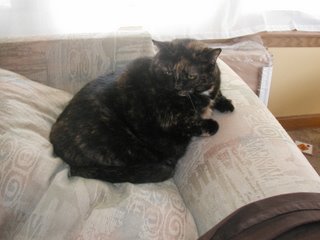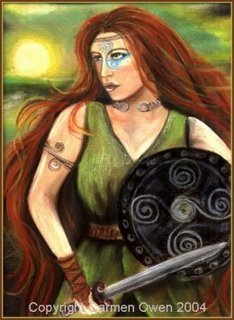It is almost Mother’s Day. This time of year I should feel proud, should be celebrating my accomplishments as a mother. Yet the strongest emotion I feel is anxiety, anxiety over facing my own mother. I am over thirty now and I still feel like the kid caught with her hand in the candy jar. When I see her, my insides get all tied up. My brain becomes paralyzed. Polite colloquialisms are the only words I permit myself to say to her for fear of saying the “wrong thing”. Our conversations resemble those of passing acquaintances rather than that of mother and daughter. I never could relate to her. I never know which direction she is coming from, how to meet her half way. I do not know the right path to take to get to her.I have always viewed her through a veil, hidden, hazy and unclear, opaque, mysterious, and dangerous.
What kind of card does one buy for such a mother? Somehow, "you've always been there for me," seems hypocritical and wrong.
My mother and father married young. She was just eighteen. He was twenty-one. Both thought they new everything, when in reality they did not yet know themselves (I know from experience—I married young/divorced young once myself). When I was born, they had been living in a flat in a “bad” neighborhood in the city. They bought a German shepherd so they could chase the drug dealers and other transients from the stairwell. The neighbors stole vegetables from their garden and clothing from their wash machine in the basement. Dad found a better job, and they bought a house in a better part of town. Things were good for some time. They had another child, my sister. I was nearing the age to start school. They decided it would be better to move to the country to give their kids a better chance than a public city school with a bad reputation could offer. They were living the American dream, buying the big house in the small town, living the life they fought against in the late ‘60s.
Almost instantly after the move, things went sour. Mom felt isolated, cut off. She was a social girl in a quiet town now. She found that staying at home, talking to toddlers all day was not her speed. She was energy, she was motion, and now, she was a caged bird. Until she met the guy two doors down (we’ll call him Dwayne). He was a sad, cold man. Vietnam had burned the humanity out of him. He wandered the streets in town in a stupor, aimlessly. Sometimes he fished, but usually he ended up in one of the many bars lining the four town streets. In a small Midwest farming town, taverns were a necessity. Not much else to do but drink away your loneliness.
My mother, the social creature she is, ducked her head out of the cage one day as the sad man wandered by. She struck up a conversation, discovered a lost cause in him, and made him her pet project. Her quiet life was boring, she needed a challenge, and found it with him. Somehow she always knew where to find him, as there are no secrets in a small town, and started seeking him out in the local watering holes. To be social, she began drinking with him, dangerous considering her father had been an alcoholic going on twenty years by that time. Soon, she found she could not refuse a drink or two. She joined a pool league, danced on bar tables, got into fights, all with her sad friend Dwayne hunkered over his drink at the bar, solitary.
The details are hazy to me how one thing led to another. I was only three or four at the time. Most of the story I gathered from rumors or speculation, always in abundance in a small town. I remember my parents screaming in the kitchen behind the closed door and the sound of broken china. I remember my sister and I huddled in each other’s arms crying ourselves to sleep as the screams filtered through the floorboards from downstairs.
It was Christmas Eve 1979 when Mom gave herself an early New Year’s present. Out with the old and in with the new. My Dad was gone, replaced with sad, crazy Dwayne. Mom and Dwayne married in June. What followed was a childhood filled with various abuses but mostly neglect. My sister and I were almost a hindrance, a remnant of a life my Mom would just as soon forgotten. So my sister and I grew up under the radar of my mother’s awareness.
What did Mom and Dwayne have in common? Mom’s family was of white-collar professionals, city dwellers, accustomed to the convenience of milkmen and neighborhood stores. They went to the doctor for check ups and had their teeth regularly cleaned and cavities filled at the dentist. Dwayne’s family was poor, blue-collar, farming folk, country boys and a little simple. They grew their own food, fixed their own cars, and let their teeth rot out of their mouths. They beat their kids with leather belts and stuck their heads in pails of water when they disobeyed. But Mom and Dwayne loved to drink. Drinking, they could ignore their differences. Everyone was in love when drunk. Nothing mattered. Good times, good times.
My sister and I never knew what to expect in that house. The rules were written in water on the sand. When the sun came up, or the wind gusted, or for almost any or no reason at all they could and would change. That was the one certainty, that you could never be certain what to expect. We were not noticed unless we disobeyed some unknown rule. Then we were punished. I discovered if I was quiet, as meek as a mouse, a good girl, I could avoid Mom’s wrath. My sister went the other way. She was trouble because trouble got attention. Any attention was better than none, even if it was negative.
After a few years, Mom and Dwayne learned that even when drunk they were completely incompatible. Dwayne detested my sister and me. If we were boys, well, that would have been something. He could teach us manly things. He could take us hunting and fishing. But we were girls and, therefore, less than contemptible. He only acknowledged us if we got in his way or to vent his growing frustration at our mother for being smart and ambitious, because eventually, Mom began to feel caged again. She needed to accomplish something. So she did something unforgivable. She stared an apprenticeship in he trades and soon made more money than Dwayne could ever hope to make. For a traditionalist, a man’s man, and a crazy man, it was unacceptable, to be one-upped by a woman. He felt unmanned by her success. Their marriage, not built on the most solid of foundations to begin with, started to crumble. They drank at separate bars. They had their own friends. Mom wrapped herself so well in her own problems that my sister and I could not find her.
As a teen, I began to recognize my feelings toward my mother were ambivalent, a mixture of terror of her wrath and longing for her approval. How could I turn to her for advice, lessons on the woman I was becoming? So I just stopped talking to her altogether except for one-word answers to her questions: yes, no, maybe. She insisted I did it to punish her, but really it was because my ambivalence rendered me mute, paralyzed with indecision.
At fourteen, I ran away and moved in with my father soon afterward. For years there was a long, deep canyon of silence between my mother and me, only broken at the birth of my daughter. A truce. Now we speak of simple things, exchange pleasantries. To me, she is still wrapped in mystery, her thoughts and motivations veiled, still the stranger passing on the street. I yearn for her approval, she who has done so much for which I disapprove, and find so difficult to forgive. I know I need to let go of the past to walk the path to her soul. Yet somehow I still think of her as the adult, myself the scared child crouching under my bed. I keep expecting her to reach out her hand for me to grasp to show me the way and comfort me. Shall I be the adult and extend my hand to her? The lifestyle she made for us left no room for children, so I was always the adult. Is it so wrong to want to be the child, for once? I know that attitude will only divide our paths farther apart and increase this over-long journey, that I will have to take the lead if I ever truly want to fill this hole inside me where my mother should be.








